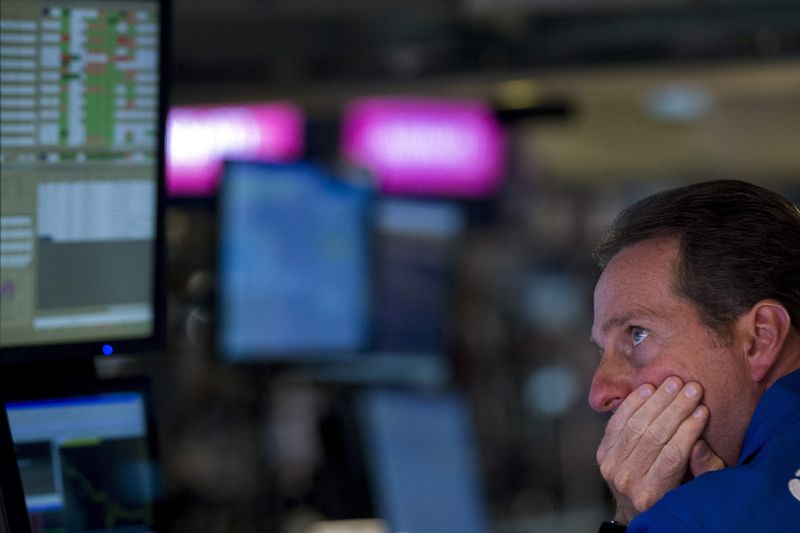By Noreen Burke
Investing.com - The coronavirus outbreak outside of China has accelerated, rattling global markets, with stocks selling off. Oil has also tumbled amid renewed concerns over the global demand outlook, while gold prices have surged to fresh seven-year peaks amid the broad-based flight to safety. The U.S. 10-year Treasury yield fell to its lowest level since 2016 and the entire German bond curve turned negative again, but the latest reading of Germany’s IFO index indicated the economy seems unaffected by the virus impact, at least so far. Here's what you need to know in financial markets today.
- Coronavirus cases outside China surge
The coronavirus outbreak outside of China has gathered pace, with a surge of cases in Italy, South Korea and Iran over the weekend, which sparked renewed fears over a hit to global economic growth.
Authorities in Italy have imposed a quarantine in the north of the country to try to halt what is the largest outbreak of the virus outside Asia, fueling concerns about the potential for the virus to spread deeper into Europe and cause economic disruption there.
There is lots of bad news on the coronavirus front with the total number of new cases still rising," AMP chief economist Shane Oliver wrote in a note.
"Of course, there is much uncertainty about the case data, new cases outside China still looks to be trending up and the economic flow on has further to go with the Chinese economy likely to have contracted in the March quarter."
In China, large parts of the country relaxed curbs on transport and travel on Monday as the number of new cases outside the worst-hit province fell to the lowest in a month.
- Global markets slump
Stock markets around the world slumped as the outlook for global growth darkened, with Italy’s FTSE MIB down more than 4%, on track for its worst day since 2016. Frankfurt and Paris were both down more than 3% and London's FTSE was down a similar amount.
In Asia, South Korea's KOSPI slumped 3.9% overnight after the government declared a high alert, while Australia's S&P/ASX 200 slid 2.25%. China's blue-chip CSI300 index closed down 0.4%. Japanese markets were closed for a public holiday.
U.S. futures pointed to a sharply lower open, with the Dow futures contract down more than 800 points or 2.7% and futures on the S&P 500 and the Nasdaq 100 both down around 3% by 6:45 AM ET (1145 GMT).
CBOE's VIX volatility index, the so-called fear gauge, hit its highest level since August.
- Oil tumbles, gold surges
Oil prices dropped 3% on Monday amid fears that the rapid spread of the virus outside of China could impact global demand.
Brent was down $2.11, or 3%, to $55.8 a barrel by by 6:45 AM ET (1145 GMT), after falling to an intraday low of $55.72 earlier. U.S. crude futures fell by $2.04, or 3.8%, to $51.34.
"Demand destruction for crude is likely to intensify as travel restrictions will likely increase as the coronavirus outbreak becomes a global threat and not just contained to China," said Edward Moya, senior market analyst at OANDA.
"Oil prices will remain vulnerable here as energy traders were not pricing in the coronavirus becoming a pandemic.
The flight to safety also saw gold prices rose more than 2% to hit their highest level since February 2013, taking its gains for the past year to more than 10%.
- Bonds rally
Ten-year U.S. Treasury yields dropped to 1.401% on Monday, their lowest since July 2016, while the yield on the 30-year Treasury touched a record low, with more investors seeking out less risky assets like government debt.
Germany’s 30-year bond yield turned negative for the first time since October, meaning the entire yield curve in the euro zone’s biggest economy was once again below zero.
"Everybody sees that this could be another leg down for the economy, and we were already in quite a fragile state to begin with," said Rabobank's head of macro strategy, Elwin de Groot. "It could be another step toward a recession in more countries."
- German IFO rises unexpectedly, but worst yet to come
Germany’s closely watched IFO business climate index unexpectedly rose this month, along with a gauge of future expectations and the IFO institute stuck to its first quarter growth forecast of 0.2%.
“The German economy seems unaffected by developments surrounding the coronavirus,” said IFO President Clemens Fuest in the report.
But other economists have greeted the report with a degree of skepticism, warning that the risk is for things to get worse before they get any better.
“Today’s IFO reading would in normal times be evidence of at least a bottoming out of the economy. However, these are no normal times. In our view, it is simply too early to gauge the exact impact on the economy, both for companies and analysts,” said Carsten Brzeski, Chief Economist ING Germany.
“One thing, however, is clear: as an open economy, Germany is again at the center of yet another adverse global event.”
--Reuters contributed to this report
